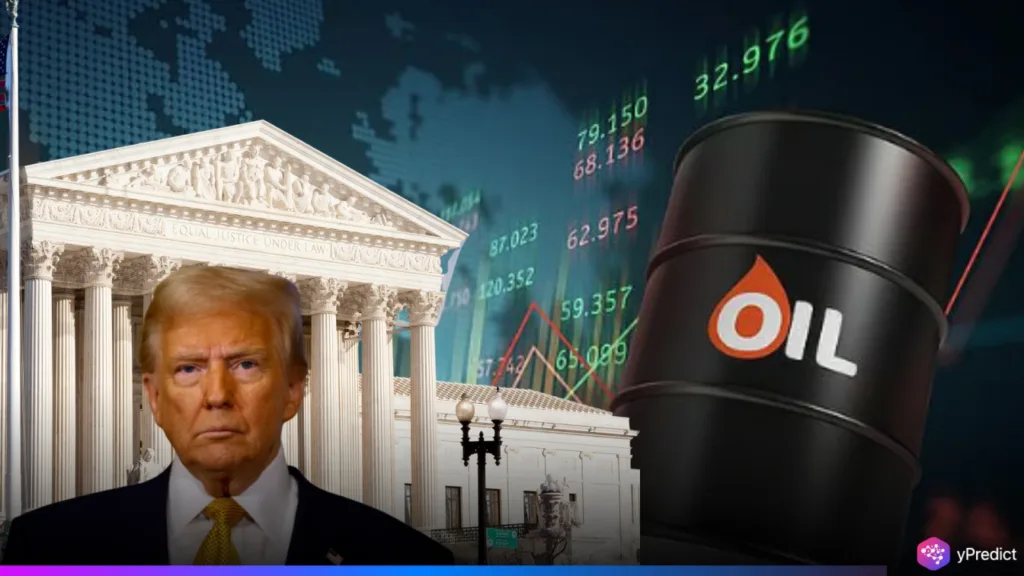
Oil prices surged significantly on Thursday after a U.S. federal court blocked most of President Donald Trump’s planned tariffs on imports, easing fears of increased trade restrictions. The ruling boosted market confidence amid ongoing concerns about supply disruptions from Venezuela and potential sanctions on Russian crude. With investors now focusing on the upcoming OPEC+ meeting and shifting geopolitical dynamics, the decision has injected fresh momentum into global energy markets and investor sentiment.
Court Ruling Spurs Market Rally as Oil Prices Surge
According to Reuters, on Wednesday, the United States Court of International Trade concluded that Trump had exceeded his constitutional authority by slapping broad-based taxes on imports without congressional authorization. The decision only applied to charges levied under the International Emergency Economic Powers Act (IEEPA), not to other industry-specific levies imposed on sectors such as steel or automotive items.
The verdict essentially blocked the so-called “Liberation Day” tariffs imposed in 2018. According to analysts, the decision eased the global markets, relieving fears about the damaging impact of protectionist trade policies on global growth. However, the Trump administration has affirmed plans to appeal the verdict, casting doubt on long-term policy ramifications. The chief commodities analyst at SEB, Bjarne Schieldrop, said in a statement that,
Markets are positive since Donald Trump got the setbacks on the tariffs. That’s less headwind for the global economy, so more demand for oil because the machine of the global economy moves better and faster.
Reacting positively to the news, oil prices surged with Brent crude futures jumping nearly 2%, rising $1.12 to $66.02 per barrel, while U.S. West Texas Intermediate (WTI) climbed $1.14 to $62.98. The ruling boosted risk appetite, reflecting optimism that trade flows would remain uninterrupted. In late morning trading, Brent gained 1.6% to $65.36, and WTI advanced 1.7% to $62.69. Futures markets also saw momentum, with August Brent contracts up 1.25% at $65.71 and July WTI futures gaining 1.34% to $62.62.
OPEC+ Meeting and Geopolitical Shocks Add to Oil Surge
Furthermore, Investors are closely monitoring Saturday’s OPEC+ meeting, where member nations are likely to finalise their July production strategy. According to sources, eight significant producers, including Saudi Arabia, Russia, and the UAE, have agreed on a proposal to boost collective output by 411,000 barrels per day, while maintaining the progressive unwinding of 2.2 million bpd in voluntary restrictions.
Analysts at ING anticipate similar incremental increases through Q3, as the alliance looks to defend market share while balancing global supply. However, concerns over a potential supply glut persist, with demand recovery still uneven across regions.
Technical indications suggest a mixed outlook. Brent crude is approaching resistance near $66 per barrel, while WTI is nearing the upper limit of its $60-$63 trading range. Bearish moving average crosses in both benchmarks point to increased volatility and potential medium-term negative pressure.
Additionally, geopolitical worries continue to influence the market sentiment. Chevron’s activities in Venezuela were abruptly halted after Washington revoked a vital operating licence, reducing output from one of Latin America’s largest producers. Meanwhile, the threat of additional sanctions on Russian petroleum looms large, fuelling supply-side concerns and keeping global oil prices stable.
Conclusion
A U.S. court’s decision to block most Trump imposed tariffs has eased trade tensions and pushed oil prices to surge, boosting investor sentiment. Despite this relief, geopolitical risks persist, including possible appeals and supply disruptions from Venezuela that threaten energy market stability. Global markets now await OPEC+ production decisions and assess shifting demand trends affecting oil prices in the coming weeks. Oil prices will likely stay volatile, driven by both political developments and economic shifts in this uncertain global environment.







